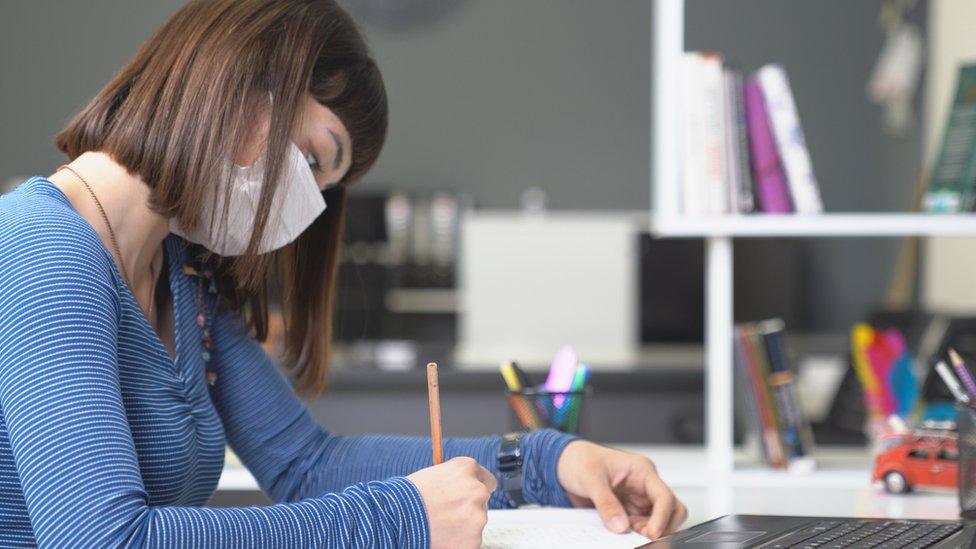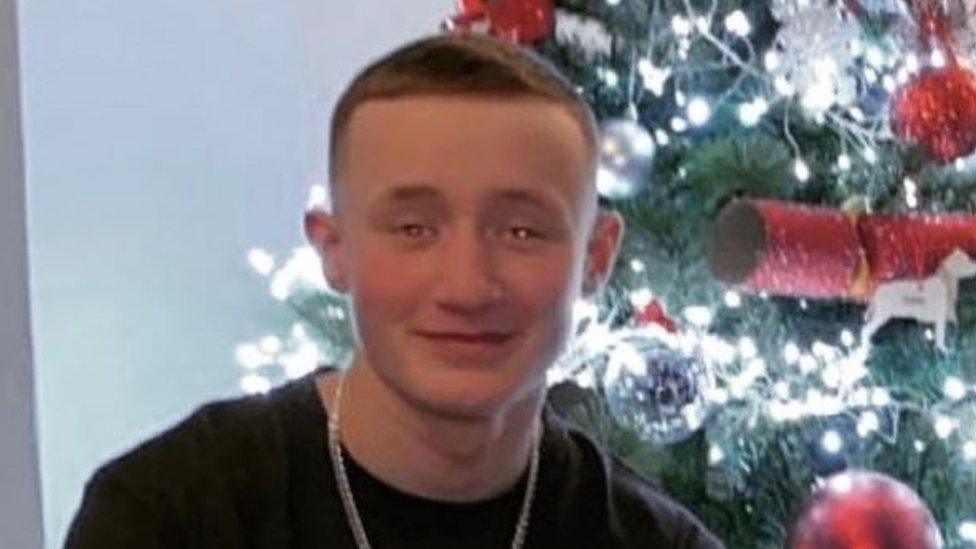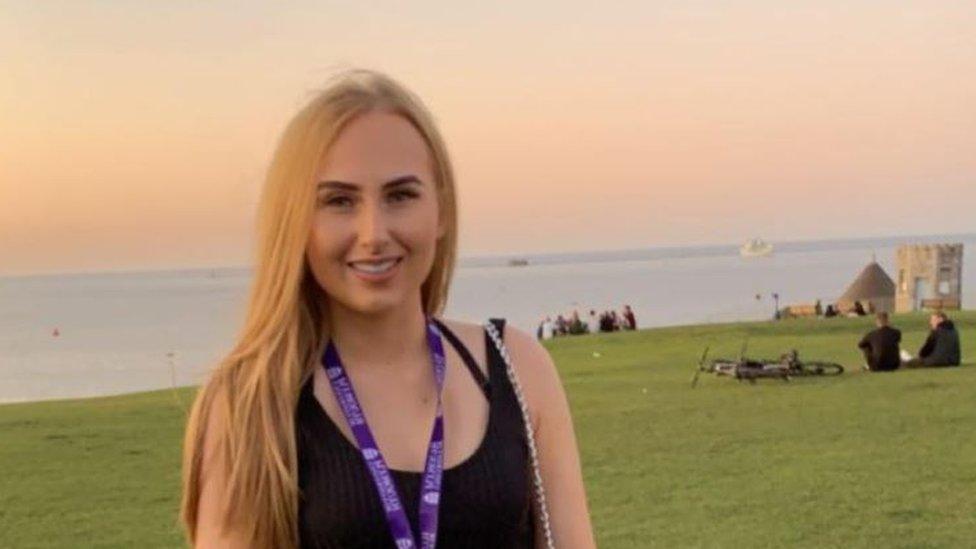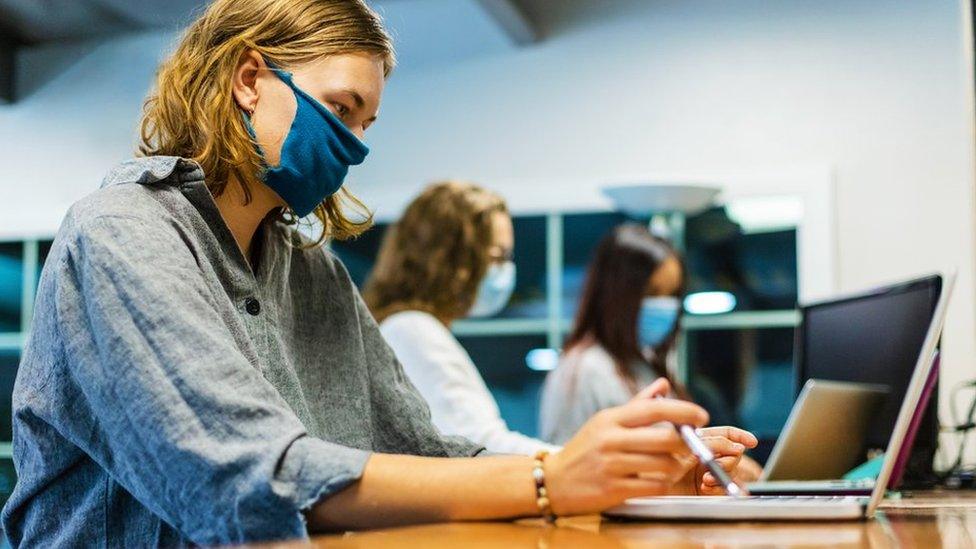Covid-19: Students frustrated at missing out on £500 help
- Published

Students in full-time education in Northern Ireland are to receive £500
Some students in Northern Ireland have expressed frustration at missing out on a newly-announced support payment.
On Thursday, Economy Minister Diane Dodds said £500 would be given to students due to disruption caused by the coronavirus pandemic.
Almost 40,000 students in universities and further education colleges are set to benefit from the money.
But part-time students and non-EU students based in Northern Ireland look set to miss out.
Northern Ireland students in other regions of the UK and the Republic of Ireland are also not eligible and Deputy First Minister Michelle O'Neill has raised that issue with the Department for the Economy, which is issuing the payments.
Her fellow Sinn Féin MLA John O'Dowd has called for payments to be made to all full-time students at further education colleges, highlighting that only those on a higher education course are currently eligible.
He said that would not be fair and that there would be a "much higher percentage of students from lower-income backgrounds studying further education courses".
"They and their families are in the greatest need of financial support at this time," he added.
Higher education courses are generally academic, while further education courses typically cover vocational skills.
'The money would help my family'
Damien Nelson attends a further education course in west Belfast and said the money would help him and his family.
The 17-year-old began his catering course at Workforce Training Services in September last year - he would normally be spending two days a week in college and three days a week on his placement.
The pandemic has made it difficult for him to find work and carry out the vocational side of his course.

Damien Nelson says his education has been made challenging due to the Covid-19 restrictions
"I am usually eager to find work but because everywhere is closed I can't," he said.
"I live with my mother and it would be nice to help her in some sort of way.
"If we do get this money it would be a big help for myself and the other people in my house."
He said he had chosen his course because he enjoys cooking for his family and had found the restrictions frustrating.
"It is hard to enjoy it because you are not there as much as you're supposed to be."
'Will I get to meet anyone in Belfast?'
Canadian student Ryley Lopushinsky, who is in her first year of a law course at Queen's University in Belfast, said it was devastating to miss out on the payment.
"I understand I am not a Northern Irish student or anything like that," she said.
"However, [international students] do pay significant amounts of fees to come here for schools and we pay significant amounts of fees to come here for visas.
"It is just like the government doesn't really care about their international population, which makes up a very large number of students who are here."

Ryley Lopushinsky would prefer to be working on her course from home in Canada
Ms Lopushinsky said that while the economy minister had advised international students to contact their higher education institutions about support through hardship funds, many were not aware that they were eligible.
She said her course moved online in October and that while a return to the classroom is planned as soon as health restrictions allow, she would have preferred to have returned home at Christmas.
"At least I would have had more support from my family instead of being here by myself, just wondering if I'll ever be able to actually have classes in person - if I'll ever get to meet anybody in Belfast."
The Department for the Economy said universities have advised they have "no means of knowing whether international students are in Northern Ireland and studying online or studying remotely from their home countries".
"International students who find themselves in genuine financial hardship still have access to funding provided through the universities' hardship funds and to support through their student union, both of which have been increased."
'It just really annoyed me'
Carla Bolt, a 20-year-old criminology and criminal justice student, had been expecting to spend her second year in Plymouth University working, studying and applying for placements.
Instead she is at home with her family near Larne, County Antrim, and has had to take on work as a special needs support worker to cover the rent she pays for accommodation in England that she is not using.

Carla Bolt feels it is not fair that she cannot receive the support payment
"My loan doesn't cover the payments at all - when I found out that people here at Queen's or the other colleges are getting £500, that just really annoyed me," she said.
"The £500, that is just underneath a month's rent - that would help. Every pound or penny counts," she said.
Ms Bolt said her university had been "fabulous" and she felt lucky to have the support of her family but the way the £500 payment was being made was not fair.
"If I didn't have my family I would be really struggling now."
Grian Ní Dhaimhín, the president of Queen's University's Students' Union, said the payment would provide short-term relief.
But students who had not been included felt "frustrated, neglected and ignored", she said, and she questioned whether enough was being done to coordinate the response across the UK.

Who is eligible for the payments?
The Covid Disruption Payments to students will be made through educational bodies to higher education students enrolled at undergraduate and postgraduate levels in Northern Ireland, and will include students from the UK and EU.
The higher education institutions included are:
Queen's University Belfast
Ulster University
Stranmillis University College
St Mary's University College
The higher education colleges included are:
Belfast Met
Southern Regional College
South Eastern Regional College
South West College
North West Regional College
Northern Regional College

- Published4 February 2021
